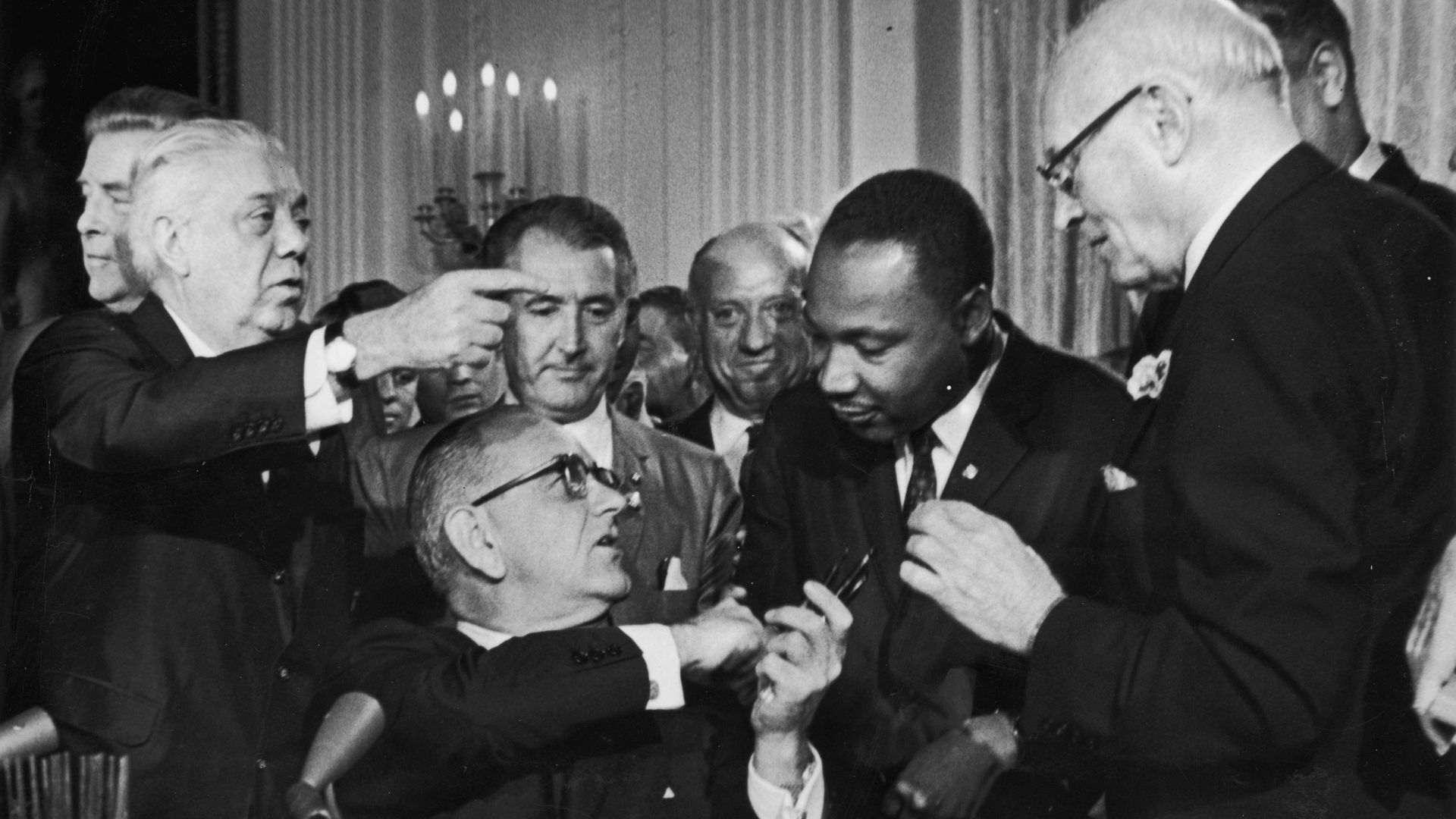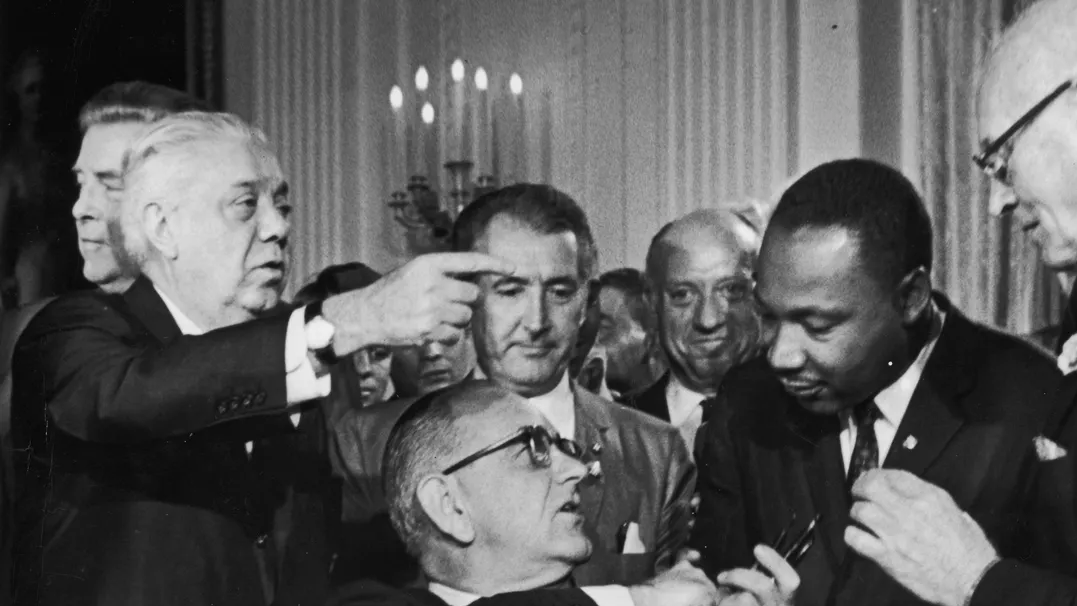 Then-President Lyndon B Johnson shakes the hand of Dr, Martin Luther King Jr. at the signing of the Civil Rights Act while officials look on, Washington D.C. Photo: Hulton Archive/Getty Images
Then-President Lyndon B Johnson shakes the hand of Dr, Martin Luther King Jr. at the signing of the Civil Rights Act while officials look on, Washington D.C. Photo: Hulton Archive/Getty Images
National Urban League president Marc H. Morial on Wednesday called President Trump’s executive order dismantling federal diversity and affirmative action practices “an assault on the Civil Rights Movement and everything we’ve achieved in the last 60 years.”
Why it matters: Morial’s comments came during a meeting of more than a dozen leaders — across racial, ethnic, and religious communities — gathered in D.C. to strategize a response just hours after Trump, fulfilling a campaign promise, moved against 60-year-old government guidelines designed to promote equity in hiring.
What they’re saying: “We knew [Trump] was coming with it early, so we took a shot and planned the roundtable two days after the inauguration,” Morial told Axios after the Demand Diversity Roundtable event at the National Press Club.
- “It was important to make our statement early, and with as many leaders in the room as possible,” he said.
Zoom out: Trump’s order revoked one President Lyndon Johnson signed in 1965, more than two years after the Rev. Martin Luther King Jr. gave his “I Have A Dream” speech at the nearby Lincoln Memorial.
- LBJ’s order gave the secretary of labor the authority to ensure equal opportunities for people of color and women in federal contractors’ recruitment, hiring, training and other employment practices.
Zoom in: Organizers said they gathered community leader from across the nation to discuss how to confront disinformation campaigns targeting diversity, equity, and inclusion (DEI) programs, reaffirm their commitment to civil rights and expose divisive myths.
- “We stand with the 81% of Americans who support economic opportunity, who support diversity, equity, and inclusion. And we stand against any effort — by anyone, through any method — to reverse the gains of the last 70 years,” Morial said before opening up the discussion.
Referencing the Civil Rights Act of 1964 as the “Magna Carta” of racial justice in America, Morial called on the nation to reaffirm its commitment to equal opportunity.
- “Diversity, equity, and inclusion are aligned with American values,” he said. “They are about uniting us, not dividing us. Efforts to paint DEI as a preference program are nothing more than campaigns of smear and distortion.”
Morial drew parallels between those historic efforts and the battle against disinformation and political backlash.
- “We will not allow unlawful, extra-constitutional, and ill-advised actions to undo the hard work of many generations of Americans. This is a moment to recommit to the Civil Rights Act of 1964 and the values that have guided us for six decades.”
The big picture: Civil rights advocates believe attacks on DEI are part of a campaign to normalize bigotry and pit communities against one another.
- “Nothing that’s happening right now is accidental,” said Amy Spitalnick, CEO of the Jewish Council for Public Affairs. “From the racist attacks on DEI to anti-immigrant and anti-LGBTQ executive orders, it’s all part of a broader effort to normalize dehumanization and extremism.”
She pointed to a recent spike in antisemitism and how extremists have sought to exploit the pain of the Jewish community to push divisive agendas.
- “Advancing diversity, equity, and inclusion is not just about values or the deep diversity within the Jewish community — it’s about ensuring that every community has a fair shot,” she said. “Diversity and pluralism are our greatest strengths.”
Latino leaders highlighted the economic and social fallout of DEI rollbacks, while Asian American and Pacific Islander (AAPI) leaders emphasized how these policies deepen inequalities, harm local economies, and hinder progress toward an inclusive democracy.
- “Anti-diversity is anti-business,” said Brenda Victoria Castillo, president of the National Hispanic Media Coalition. “Representation in leadership and media isn’t just morally right; it’s essential for success in a diverse America.”
- “Opponents attack DEI because it works,” said Gregg Orton, national director of the National Council of Asian-Pacific Americans. “When communities of color are empowered, it threatens the status quo of power and control.”
The bottom line: The message from the roundtable was clear: Defending DEI is not just about protecting civil rights but about preserving the nation’s soul.
- “We won’t stand idly by,” said Derrick Johnson, president of the NAACP. “Our coalition is stronger than the fears that divide us—and this fight is just beginning.”
Go deeper: Trump administration moves to oust federal DEI employees



